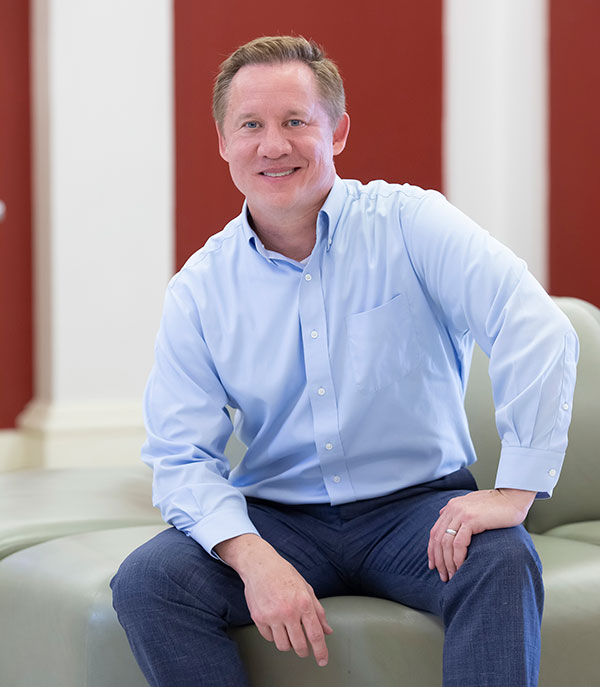
As the Freeman School’s new associate dean of undergraduate education, Myke Yest is working to deliver a seamless, fully integrated educational experience.
When Dean Paulo Goes asked Myke Yest to lead the Freeman School’s Office of Undergraduate Education, Yest had to think about it.
In more than 20 years on the faculty, Yest, a senior professor of practice, had established himself as one of the school’s most popular and accomplished instructors, with a resume that included developing the Aaron Selber Jr. Course on Distressed Debt, co-founding the Altman Program in International Studies & Business, and winning numerous awards for his teaching. He wasn’t ready to give that up.
“I’ve always been very close to my students and knew I didn’t want to give up teaching,” Yest recalls. “But when Paulo said it would be a way for me to have a bigger impact on students and what they take away from their time at Freeman and Tulane, that’s what got me. I kind of get choked up when I think about what’s possible with the amazing talent that we have in our student body.”
Since taking on the role of associate dean of undergraduate education in July, Yest has devoted himself to leveraging that talent as he begins to reimagine what Freeman’s Bachelor of Science in Management program can be.
“It’s easy for students to see the program as just a collection of courses, but it’s so much more,” Yest says. “It’s an experience. Yes, the courses are important, but who are you after you’ve taken all those courses? They are one part of your selfstory, which is made up of your collective experiences at Freeman. We want to help students see that their voice and identity are important, and both should be infused into everything they do here and after they graduate.”
With 2,700 undergraduate students — roughly a third of Tulane’s entire undergraduate population — the business school is Tulane’s single largest school, a status that gives Freeman’s Office of Undergraduate Education a disproportionate role in delivering Tulane’s undergraduate experience. Yest takes that responsibility seriously, and he feels strongly that the key to giving students the best experience they can get is treating them like the individuals they are.
“Think of Freeman as a multi-player, multi-stage video game you’re playing, and the goal is graduation,” Yest says. “There’s a multitude of ways you can get there, and you’ve got people all along the way who can pull you up to the next level or launch you forward from the last level to help with your success. That’s the message we really want students to embrace. It’s not just about checking off the boxes and having all those credit hours. It’s about discovering who you are and where you want to go.”
In collaboration with those people along the way — the faculty, staff, students and alumni who interact with and support undergraduate students — Yest says the goal is to deliver a seamless, fully integrated educational experience that begins when a student first considers a business degree and follows them throughout their tenure at Freeman. That means integrating academic programs, student advising, career counseling, internship opportunities, experiential learning, study abroad, student organizations, job placement and, ultimately, alumni affairs.
“We’re being very intentional in preparing students for whatever is in store for them post-Tulane,” Yest says. “And that might not be a traditional corporate job. It might be graduate school, or it might be going abroad and working for an NGO. Regardless of where they’re going, they’re going to be ready.”
Giving students more areas of study to explore is part of the equation. Last year, the Office of Undergraduate Education rolled out a new minor in Entrepreneurial Business that will eventually be open to students from across the university. This spring, the office will introduce new certificate programs in Hospitality, Sports Management, and Real Estate Finance & Investment. In addition, the new Schwartz Family Center for Experiential Business Learning will dramatically expand experiential learning opportunities at the undergraduate level across all of Freeman’s majors. Yest says changes to the curriculum are also in the works that will ensure that the program remains relevant, interconnected and student focused.
“I feel like the business school is really undergoing a renaissance,” Yest says. “Under Dean Goes’ leadership, we’re focused on building a top-quality,
nationally ranked undergraduate business program, and I’m excited to be a part of that effort.”
